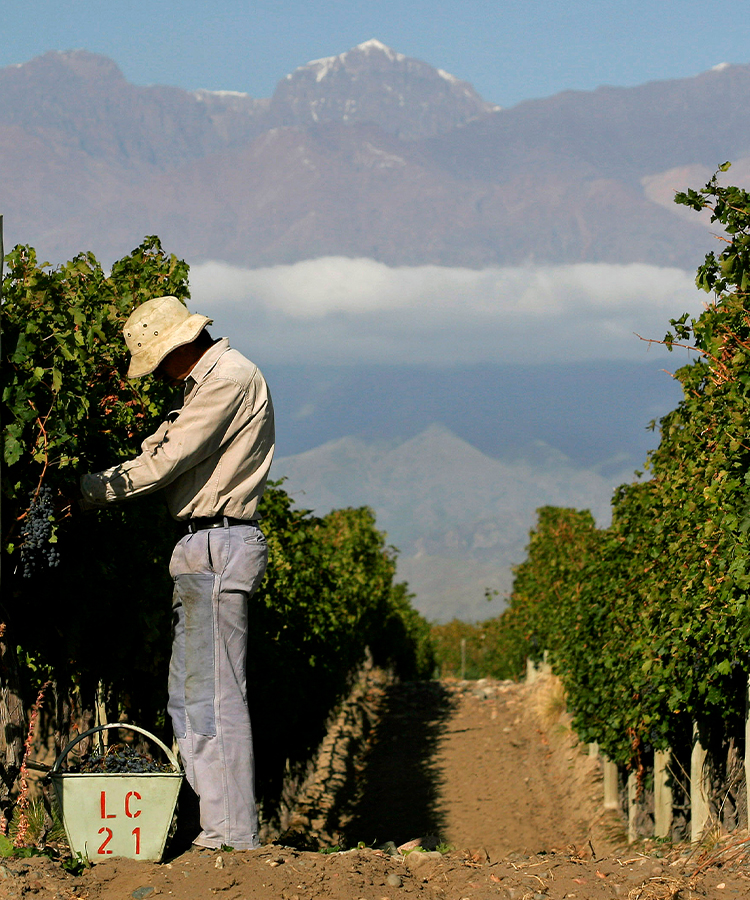
Now more than ever, many are seeking to transform a simple toast into a special occasion. And what better way to celebrate the joys of life and the importance of family, both inherited and chosen, than with a bottle that honors generations of artisanship, superior quality, and a commitment to the land?
Family-owned Banville Wine Merchants (BWM), founded in 2004 by Lia Tolaini Banville, is a national importer with a passion for fine wines and spirits. A strong female leader in a male-dominated field, Lia sought to create a modern, independent business that pays homage to legacy estates, champions small producers, and boasts a label for every occasion. Honoring her deep connection to Italy with a diverse collection of elegant wineries, Banville has extended her import portfolio to over 50 hand-picked selections, stretching from the “Great Boot” to South America. So this season, raise a glass to great grapes and familial ties with a bottle from this impressive roster.
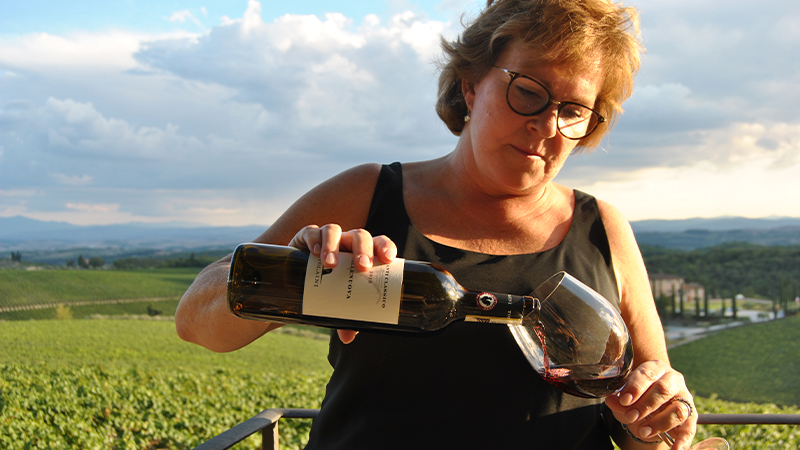
A Sumptuous Road Trip Through a Terroir That’s as Diverse as Italy Itself
Journeying through Italy’s Chianti Classico region brings wine lovers from the north near Florence down through the Chianti Classico communes to the southernmost commune of Castelnuovo Berardenga, which is just seven miles east of Siena and 18 miles north of Montalcino. This area of Chianti Classico is known for producing wines of strength, elegance, and longevity and was the motive for choosing the Montebello and Vallenuova vineyards as the perfect home for Tolaini. Capitalizing on the varied elevation of the property’s natural, south-facing amphitheater, Pier Luigi Tolaini planted high-density vines in the prized Galestro soil and built a state-of-the-art winery in a renaissance Tuscan villa on the property. He understood the great potential that this land possessed and knew it was where he would realize his dream of making world-class wines.
Sustainable and organic farming practices are an important focus at Tolaini, as is showcasing Tuscany’s native variety, Sangiovese, with the estate’s single-vineyard Chianti Classico Gran Selezione and Tre Bicchieri-winning Vallenuova Chianti Classico. Pier Luigi had a great passion for Super Tuscans as he loved Bordeaux and the juicier Napa wines of the mid-1990s. His flagship wine, Picconero, is made from Cabernet Franc and Merlot and continues to garner rave reviews.
Tolaini epitomizes the concept of “family business” and today Pier Luigi’s daughter, Lia Tolaini Banville, is running the estate and preserving her father’s legacy while bringing new ideas and innovation, all while honoring the distinct terroir of Castelnuovo Berardenga.
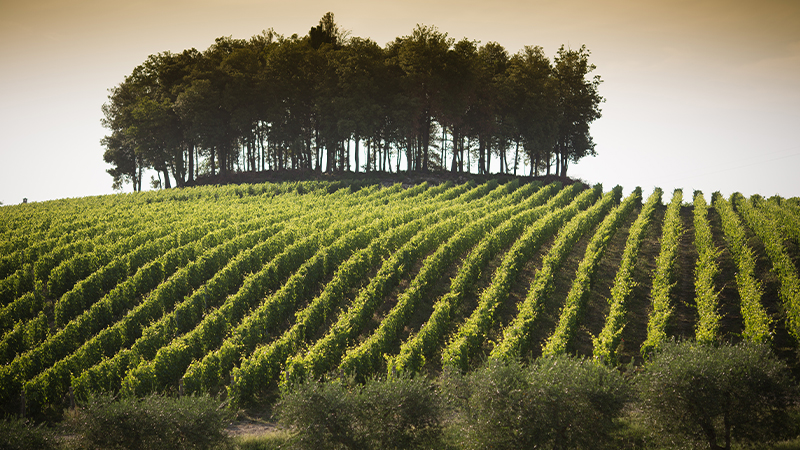
Lia launched Donna Laura Wines in Castelnuovo Berardenga in 2004 to honor the legacy of her beloved aunt and mentor, Zia Laura. With each bottle, Lia captures the essence of conviviality, the Italian tradition of family together at mealtime. Wine is a part of each family meal and is as vital as bread and salt. Focusing on sustainable and organic farming practices that forgo harmful chemicals to insure a vibrant ecosystem, Donna Laura wines are an expression of the native Tuscan varietal, Sangiovese. Balanced and approachable, these wines are ideal for everyday enjoyment and a reminder of family and food and how they are synonymous at the Italian table.
Traveling from central Italy to the mountainous countryside of the northeast, at Cantina Terlano in South Tyrol each varietal is aged to optimization, whether that takes years or even decades. Here, winegrowing was introduced in pre-Roman times, the land long prized for its sunny climate and location above the floodplain. One of the oldest cooperatives in Italy, many growers and their families have worked with Terlano for over 100 years. Terlano is known for producing wines with incredible aging potential. The wines’ longevity is in part a result of the combination of the soils’ high mineral content –– Terlano’s vineyards are nestled within a rich volcanic rock, its porosity ensuring optimal soil drainage –– and old vines, as well as the rigorous selection of vibrant, fully mature grapes. The Selections are often held in large wooden barrels and left to age on the lees before bottling, allowing each to blossom into a wholly unique character and complexity.
Tradition and time-honored relationships, forged over almost two centuries of craftsmanship, are the pillars of success at Farina Wines. Located in the heart of Valpolicella Classica, the original historic region of Amarone and Ripasso winemaking in the Veneto, Farina is owned by Claudio and Elena Farina, two cousins who represent the third generation of this winemaking family, with the guidance of Sandro, Claudio’s father. With an ideal climate for grape-growing, thanks to the moderating influence of nearby Lake Garda and the fresh breezes from Monte Baldo and the Monti Lessini hills, Farina is well known for producing velvety, rich Amarone wines and vibrant Ripasso blends. All of Farina’s wines are made from varietals that are indigenous to the Veneto, including Corvina, which is known as the “queen“ of grapes here. Corvina, with its thick skin and loose bunches, is particularly well suited to the region’s traditional appassimento technique. After careful selection in the vineyard, the grapes are dried for a few months in a special room called a “fruttaio,” then gently pressed. Fermentation follows in stainless-steel tanks and then the wine ages in large, Slavonian oak barrels for a minimum of 24 months. This long, traditional winemaking process produces the signature Amarone wines that Farina is famous for — distinct, with a sophisticated structure that balances the traditional velvety, rich, unctuous beauty of this wine with a modern freshness.
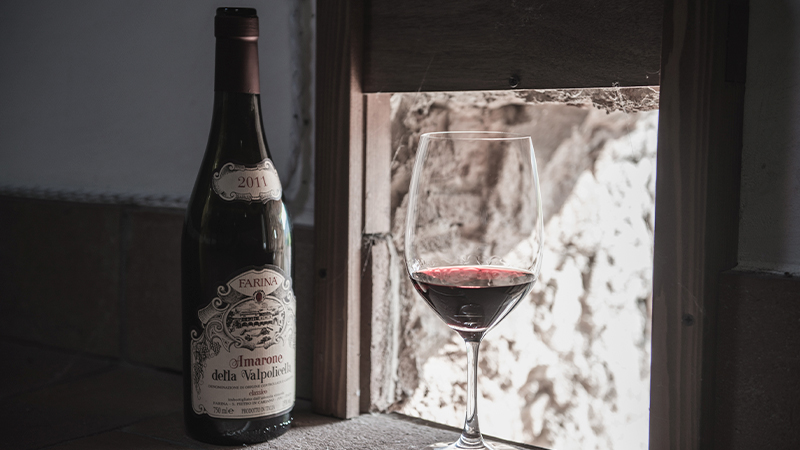
San Salvatore 1988 sits within Cilento National Park in the Campania region of southern Italy. The estate’s rich biodiversity, enhanced by its proximity to the sea and high-altitude vineyards, together create an ideal environment for crisp whites and expressive red wines made from varietals like Falanghina, Fiano, Greco, and Aglianico, which were originally introduced to the region by the ancient Greeks. Launched in 2006 by entrepreneur and hotelier Giuseppe Pagano, who named the project after his son, Salvatore, born in 1988, San Salvatore 1988 fuses the latest in winemaking techniques with organic sustainable farming — no artificial products or chemicals. Its power supply is from an onsite facility that helps to reduce the winery’s carbon footprint. Roaming the vineyards is a herd of 650 bufala (buffalo that supply milk for the Pagano family’s historic mozzarella production) that provide an all-natural fertilizer that aids in the integrated biodynamic cycle of complete recovery of the land. San Salvatore’s Pian di Stio Fiano has received the coveted Tre Bicchieri award from Gambero Rosso for the three most recent vintages.
A unique Mediterranean paradise with a strong and independent spirit, Sardinia has been home to Mario Pala and his family for many generations. Since 1950, Mario’s family has grown grapes on their estate in southeastern Sardinia in the town of Serdiana. Their eight vineyard sites encompass a wide range of terroirs from limestone hills overlooking the sea to sandy plots located just a few miles from the shore. The Pala family is passionate about making wine using organic farming practices that reflect the importance of terroir, tradition, and respect for the environment. A champion of native Sardinian varietals like Nuragus, Monica, and Bovale, Pala is also well known for its refreshing Vermentino and seductive Cannonau wines that honor the distinct terroir of this extraordinary island.
A World Apart
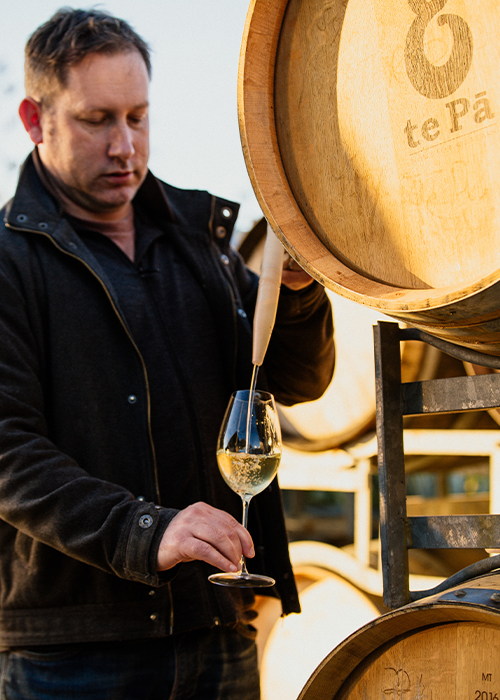
A newer addition to the BWM family, New Zealand’s te Pā Family Vineyards was founded by Haysley MacDonald, who traces his ancestry to the early Māori settlers who landed in the Wairau Bar region some 800 years ago. In 2003, MacDonald transformed the family farm into vineyards, with the flagship Marlborough estate extending from the Lower Wairau Valley to newer plantings in the Awatere Valley. At the Seaside Reserve vineyard in the Lower Wairau Valley, resilient vines and a frost-free environment enable an earlier ripening of grapes, yielding crisp Sauvignon Blanc and flavorful Pinot Gris. At the Redwood Hills estate vineyard in the Awatere Valley sub-region, clay and stony loam soils produce vines with deep roots that pull from the coastal influences and sunshine to produce a distinctive white wine. As kaitiaki (stewards of the land), the MacDonald family and the te Pā team are committed to conservation, challenging themselves to champion new techniques of sustainable water management and soil regeneration.
Several hours and continents away, the family-run Argentinian Andeluna winery has adopted a similar approach to honoring the land. Located on the rocky terrain of Gualtallary, Tupungato, Mendoza at the foot of the Andes, the winery’s name merges the words ANDE (the Andes) and LUNA (moon in Spanish) to evoke passion and magic, its high altitude literally elevating the label above all others. Initially founded in 2003, the Barale family-owned winery utilizes Gualtallary’s altitude and calcareous soil to produce reds with intense fresh and fruity expression. Focusing on heritage wines that capture the area’s unique terroir, the family has produced some of Argentina’s top Malbec and Cabernets.
Ultimately, what shines through in each of Banville Wine Merchant’s many producers is a commitment to community and a passion for locally sourced, lovingly cultivated vines. But no matter what your mood or desired flavor profile, there is something for everyone in Banville’s diverse portfolio. Maybe even a pairing for your next family get-together.
This article is sponsored by Banville Wine Merchants.
